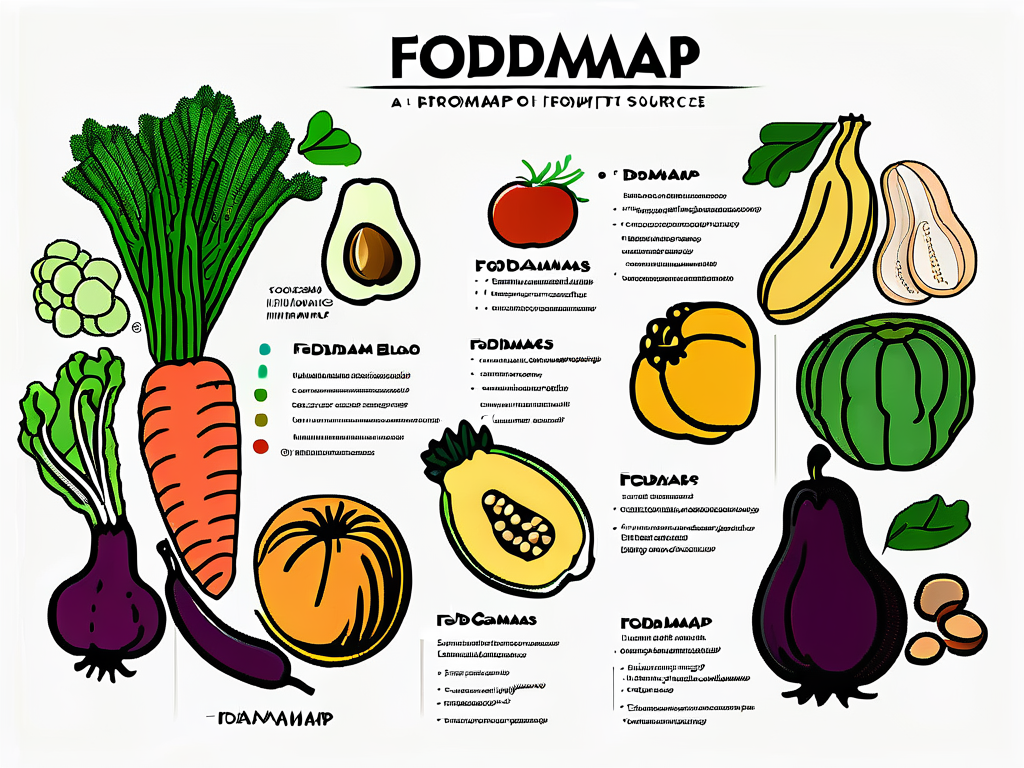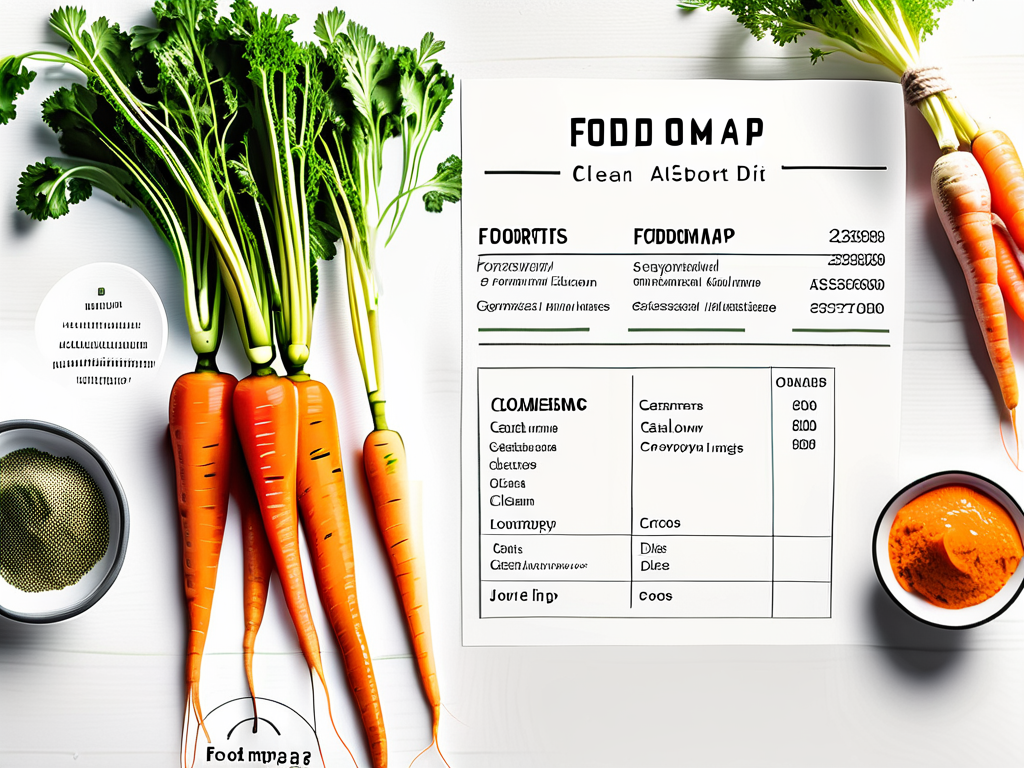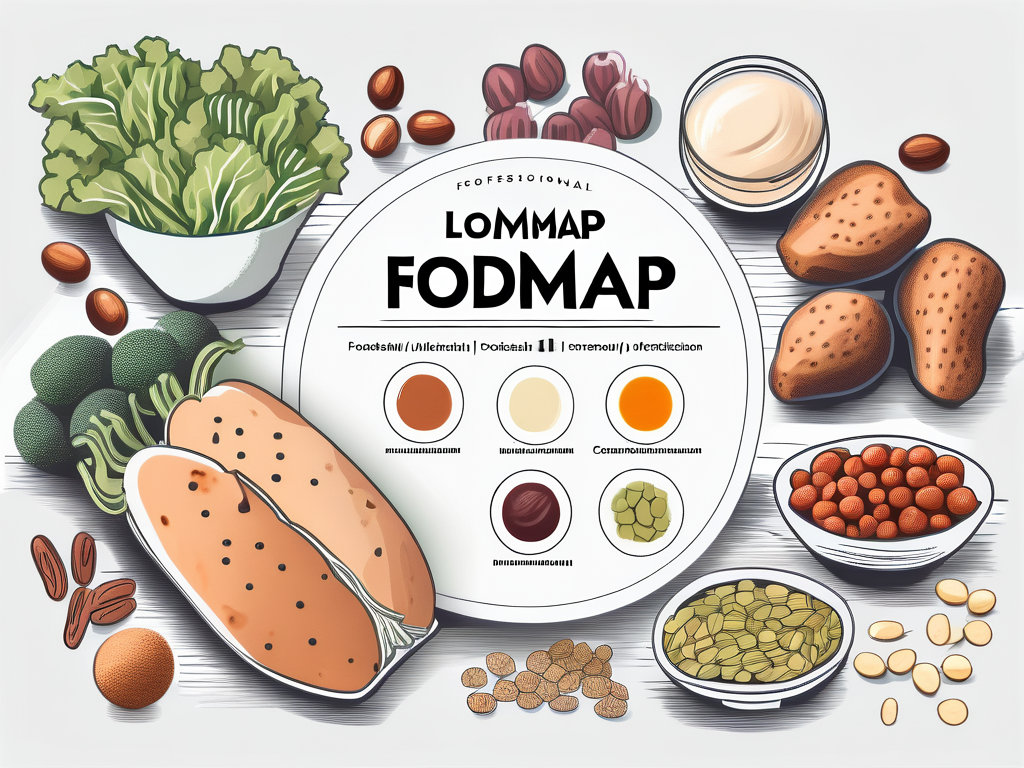Carrots are a popular vegetable that can add color, texture, and flavor to a variety of dishes. But if you are following a low FODMAP diet, you might be wondering if carrots are a good choice for you. In this article, we will explore the FODMAP content of carrots, their nutritional profile, the benefits of including them in a low FODMAP diet, and how to prepare them to fit into your dietary needs. We will also discuss other low FODMAP foods that you can consider incorporating into your meals. So, let's dive in and find out if carrots are low FODMAP-friendly!
Understanding FODMAPs
Before we delve into the FODMAP content of carrots, it's essential to grasp the intricate world of FODMAPs and their significance in dietary considerations. FODMAP is an acronym for Fermentable Oligosaccharides, Disaccharides, Monosaccharides, and Polyols. These compounds encompass short-chain carbohydrates and sugar alcohols that resist absorption in the small intestine. For certain individuals, the consumption of high FODMAP foods can lead to uncomfortable digestive issues like bloating, gas, abdominal pain, and diarrhea. Adhering to a low FODMAP diet can be a game-changer in managing and alleviating these distressing symptoms.

What are FODMAPs?
The realm of FODMAPs is vast and diverse, with a myriad of compounds present in a variety of food sources. High FODMAP foods include notorious culprits such as onions, garlic, wheat, dairy products, and specific fruits. These items harbor sugars that possess the ability to attract water into the intestine and undergo fermentation by gut bacteria, culminating in discomfort for susceptible individuals.
Why are FODMAPs Important?
The significance of FODMAPs lies in their potential to incite gastrointestinal distress in individuals grappling with conditions like irritable bowel syndrome (IBS) or other functional gastrointestinal disorders. By curbing the consumption of high FODMAP foods, individuals can potentially mitigate their symptoms and cultivate a healthier digestive milieu.
The FODMAP Content of Carrots
Now, let's move specifically to carrots and their FODMAP content. Carrots are generally considered low FODMAP and are safe to consume for most individuals following a low FODMAP diet. However, they do contain some FODMAPs that can be problematic for certain individuals in large quantities.
Nutritional Profile of Carrots
Carrots are an excellent source of vitamins, minerals, and fiber. They are rich in vitamin A, vitamin K, potassium, and antioxidants. These nutrients are essential for maintaining a healthy body and supporting various bodily functions. Carrots also contain a good amount of dietary fiber, which is important for promoting healthy digestion and regulating bowel movements.
Moreover, carrots are known for their beta-carotene content, which is a precursor to vitamin A. Beta-carotene is a powerful antioxidant that helps protect the body from harmful free radicals and plays a key role in maintaining healthy vision and skin. Including carrots in your diet can contribute to your overall antioxidant intake and support your body's defense against oxidative stress.
How Carrots Fit into a Low FODMAP Diet
Carrots are considered low FODMAP when consumed in moderate amounts. The key is to stick to appropriate serving sizes to avoid excessive intake of FODMAPs. The Monash University Low FODMAP Diet app suggests a serving size of about 61 grams (approximately 1 medium carrot) as low FODMAP. However, individual tolerance can vary, so it's always a good idea to listen to your body and adjust serving sizes accordingly.
Additionally, the fiber content in carrots not only supports digestive health but also helps in promoting a feeling of fullness, which can be beneficial for weight management. The crunchiness of raw carrots can also aid in oral health by stimulating saliva production and promoting gum health. Incorporating carrots into your meals and snacks can be a nutritious and flavorful way to enhance your overall well-being.
Benefits of Including Carrots in a Low FODMAP Diet
Carrots offer numerous health benefits, making them a valuable addition to a low FODMAP diet. Let's explore some of the benefits they provide:

Health Benefits of Carrots
First and foremost, carrots are an excellent source of beta-carotene, which is converted to vitamin A in the body. Vitamin A plays a crucial role in promoting healthy vision, supporting the immune system, and maintaining healthy skin. Carrots are also a good source of antioxidants, which help protect the body against free radical damage and reduce the risk of chronic diseases.
Moreover, carrots are rich in dietary fiber, which is essential for maintaining a healthy digestive system. The fiber in carrots can aid in digestion, promote regular bowel movements, and support gut health. Including carrots in your low FODMAP diet can help ensure you are getting an adequate amount of fiber, which is often lacking in restricted diets.
How Carrots Can Enhance Your Low FODMAP Diet
In addition to their nutritional benefits, carrots can add flavor and texture to your meals. They can be enjoyed raw as a crunchy snack or added to salads, stir-fries, soups, and stews. Their natural sweetness can also be utilized to enhance the taste of baked goods, smoothies, and even low FODMAP desserts. With a bit of creativity, you can incorporate carrots into a variety of low FODMAP recipes and enjoy their nutritional goodness.
Furthermore, carrots are a versatile vegetable that can be prepared in numerous ways. They can be roasted with herbs and spices, steamed and seasoned, or even pickled for a tangy addition to your meals. The variety of cooking methods available for carrots ensures that you can enjoy them in different ways, keeping your low FODMAP diet interesting and delicious.
Preparing Carrots for a Low FODMAP Diet
When preparing carrots for a low FODMAP diet, there are a few things to keep in mind:
Carrots are not only a versatile and nutritious vegetable but also a great option for those following a low FODMAP diet. They are rich in essential nutrients like vitamin A, fiber, and antioxidants, making them a valuable addition to your meals. When it comes to incorporating carrots into your diet, there are various creative ways to enjoy them while keeping your FODMAP intake in check.
Cooking Methods and Their Impact on FODMAPs
Carrots can be enjoyed both raw and cooked, but cooking methods can affect their FODMAP content. Boiling carrots in water can leach out some of the water-soluble FODMAPs, making them even more suitable for a low FODMAP diet. However, roasting or sautéing carrots in oil can help enhance their natural flavors and make them a delicious addition to your meals.
Another cooking method to consider is steaming, which can help retain the nutrients in carrots while softening them for easy digestion. Steamed carrots can be seasoned with herbs and spices to elevate their taste without compromising their FODMAP levels.
Best Ways to Incorporate Carrots into Your Diet
There are countless ways to incorporate carrots into your low FODMAP diet. Here are some ideas to get you started:
- Add grated carrots to your salads for some extra crunch and color.
- Make a carrot and ginger soup using low FODMAP ingredients.
- Roast carrots with a sprinkle of herbs and spices for a flavorful side dish.
- Sauté carrots with other low FODMAP vegetables for a colorful stir-fry.
- Use grated carrots as a topping for your low FODMAP tacos or nachos.
Experimenting with different cooking techniques and flavor combinations can help you discover new ways to enjoy carrots while following a low FODMAP diet. Whether you prefer them raw, cooked, or blended into a delicious dish, carrots can be a versatile and nutritious addition to your meals.
Other Low FODMAP Foods to Consider
In addition to carrots, there are many other low FODMAP foods that you can consider incorporating into your meals. Here are some categories to explore:

Fruits and Vegetables on the Low FODMAP List
There are numerous fruits and vegetables that are considered low FODMAP. Some examples include bananas, blueberries, strawberries, spinach, kale, zucchini, and bell peppers. These can provide you with a wide range of nutrients while keeping your FODMAP intake in check.
Exploring the world of low FODMAP fruits and vegetables can open up a whole new culinary experience. For example, bananas are not only a convenient and portable snack but also a great source of potassium and vitamin C. Blueberries and strawberries are packed with antioxidants, while leafy greens like spinach and kale offer a plethora of vitamins and minerals to support overall health. Zucchini and bell peppers can add color and flavor to your dishes, making them both visually appealing and delicious.
Grains and Proteins Suitable for a Low FODMAP Diet
When it comes to grains and proteins, there are also options available for those following a low FODMAP diet. Quinoa, rice, oats, and gluten-free bread are some low FODMAP grain choices. Proteins such as chicken, beef, tofu, tempeh, and certain types of fish can also be enjoyed as part of a low FODMAP meal.
Exploring the realm of low FODMAP grains and proteins can add variety and excitement to your meals. Quinoa, known as a complete protein, is not only delicious but also rich in fiber and various nutrients. Rice, a staple in many cuisines, is easy to digest and can be a great source of energy. Oats, when certified gluten-free, can be a comforting breakfast option that is gentle on the stomach. Incorporating these grains into your diet can provide a satisfying and nourishing experience.
In conclusion, carrots are generally considered low FODMAP and can be enjoyed as part of a well-balanced low FODMAP diet. They offer a range of nutritional benefits and can be prepared in various ways to enhance your meals. Remember to always listen to your body and adjust serving sizes as needed. With the right approach, you can enjoy the many benefits of carrots while keeping your digestive health in check!